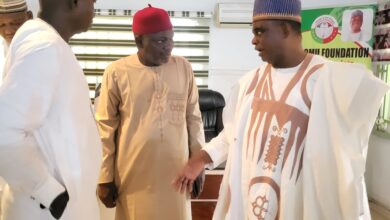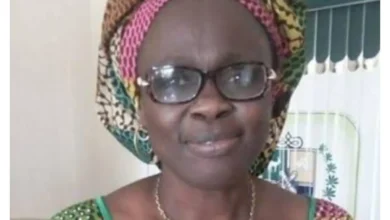Eid-el-Fitr: Ilorin scholars speaks on pray-at-home directive
…lessons, significance of unique celebration
By Mumini AbdulKareem
Top Islamic scholars in Ilorin weekend commented on the stay-at-home directive of this year’s Eid-el-Fitr celebration by the Kwara State government over the COVID-19 pandemic.
Governor Abdulrahman Abdulrazaq while felicitating with the Muslim community in the state for successful completion of the last Ramadan had reiterated the ban on the religious activities.
According to the Governor “Muslims should observe their Eid prayers at home as the ban on large social and religious gatherings which is typical of the end of Ramadan prayers remains in place as part of the measures to curtail the spread of COVID-19 pandemic. ”
The celebration that usually followed the Eid-el-Fitr was also observed low-key devoid of the usual fanfare that normally characterise it.
Muslim faithful across the state deserted praying grounds due to the directive and also celebrated with members of their immediate families at home.
Speaking on the issue, a member of the Kwara State Council of Ulama, Imam Yusuf Murtala told National Pilot in a telephone chat that this year’s Eid was significant in many fronts for the Muslims, adding that pandemic and lockdown provided opportunity for monitoring of the family’s religious activities.
He said the significance of the eid and the lockdown during Ramadan brought individuals closer to God unlike when many were looking forward to scholars, adding that the Council of Ulama in the State sat to decide how to observe the Eid and Sallah celebration.
He said:”Before the eid, the Emir of Ilorin instructed the Chief Imam of Ilorin and chairman of the council of Ulama, Alhaji Muhammed Bashir Solih to call a meeting of the council and we congregated in his house to deliberate on how to observe this year’s Eid.
“Prior then, the Sultan of Sokoto and leader of the Muslim community in Nigeria, Alhaji Saad Abubakar III had informed the Emir of Ilorin that in Sokoto, there was not going to be open Eid and the entire Muslims in Nigeria should follow suit. The sultan added that eid will be observed in all the central mosques in Sokoto for the social distancing rule to be controlled.
“But when our Ulama sat on the issue in Ilorin here, we saw that the best we can do is for individuals to observe eid in their respective houses and our decision was based on the fact that when we consulted the books and traditions of the Prophet (SAW), we found out that during the time of the Prophet, some of the companions who missed Eid for one reason or the other go back home and pray it individually with the family or alone. This does not mean the person will not be rewarded with the original reward for Eid because the prayer is a stressed supererogatory but not obligatory and the Prophet observed all Eids during his life time.
“This is why most of the scholars agreed or have consensus that anytime the Eid, which ever of them, falls on a Jumua’at day, it is permissible to pray the Eid and observe Jumu’ah like Zuhr with four compulsory rakats rather than the traditional two.
“But despite the Eid being Sunnah Muwakkada (stressed), there is no laid down punishment for anyone that doesn’t observe it and that is why scholars agreed it can be prayed individually at home. Among those close to the Prophet that observed it with his family after he missed that of the Prophet was Anas Ibn Malik. The only difference between the one observed individually and centrally is that there will not be Khutba (sermon) in the individual one. All other things are same.
“The reason is due to the fact that the issue of COVID-19 pandemic abrogated five daily congregational prayers in mosques, Jumu’at prayer and others which are ordinarily compulsory, then praying Eid in congregation with larger congregants will negate all previous actions. The prayer will even be held amidst uncertainly about the health status of the person standing behind, beside or in front of us whether he is positive or not which negates one of the core principles of prayer itself.
“During our deliberation at the Ulama meeting, a member received a telephone message from Egypt which is a leading Islamic country in Islamic learning and jurisprudence explaining what prominent scholars in Egypt especially in Al-Azhar University, a leading Islamic University had reached a consensus on this, supporting our position. We also saw that it was also the same position in most of the other Islamic countries we monitored.
“This situation, though novel with us, has been well taken care of by Islam going by events during the time of the Prophet (SAW). From time immemorial, praying nawafil at home for Muslims is more rewarding than praying it in the mosque because it will among other things eliminate show-off.
“So the lesson from this year’s Eid and COVID-19 for Muslim is for us to be ready to accept the Almighty Allah’s decree anytime in life just like this one that was never envisaged but has been documented with Allah before now. Anybody that refused to adhere to the counsel of the scholars has rejected Allah predestination which is among the core principles of faith. It’s in clear consonance with the English phrase that no condition is permanent. It means how we observed the Eid this time is also not permanent.
“We must learn to always respect and accept the position of our scholars on any issue just like this situation has warranted. Almighty Allah said in the Qur’an that we must always obey Him, His messenger and the people in authority. It’s unfortunate that we still have some people that defiled scholars instruction who went to observe the Eid in congregation as during normal situation. They have not only rejected Allah’s destiny but also rejected His injunction in the Glorious Qur’an. A governor supposes to work hand in hand in conjunction with the Federal Government to solve this issue and not compounding it in the name of religion.
“We can see the example of this in Kabba in Makkah during congregational prayers and Tarawih and in the attendance at the Easter Mass in the Vatican City where only a handful of people attended in compliance with the directive on social distancing. Those that observed Eid only followed their desires and limited knowledge about the issue not the position of Islam. Our advice to them is that next time for the benefit of all of us as stated in Usul Fiqh that protecting oneself and soul supersedes worshipping Allah. That is we must safeguard our soul first before we can worship Allah because it’s only those who are alive that can worship”, he noted.
Imam Murtala also said “Devout Muslims should see this period as one of reflection to strengthen the family bond. Unlike before that I don’t have the chance to properly monitor my children and wards for their solat, this lockdown afforded me that opportunity and I observe the five daily prayers with them together in congregation with my wives and relatives. Ordinarily, I would have left some of them at home to go and pray at the mosque.
“This pandemic is also way that the Almighty Allah used to humble humanity like He said in many places in the Qur’an that mankind should not be deluded that he is secure from the wrath of Allah whether natural or man-made permitted by Him as the coronavirus. This has shown that it is only Allah that has supreme power and not those so called countries that arrogated the title of world super powers to themselves. Imagine a virus that is ordinarily so powerless, can’t fly and can jump beyond certain distance and can only survive certain conditions, it’s one of the weakest in the creations of Allah, but look at how it dealt with the world and its people on issue of economy, education social interaction including football, political and all other aspects of our existence and some countries like Germany, America, UK and others are not also spared with some already entering recession. It means no matter how we may brag about our advancement and development; it will not take Almighty Allah less than a minute to deal with the world and the people despite our size and number. So we should reflect and return to Him in all our daily activities”, he submitted.
On his part, former Dean of Faculty of Religion, University of Ilorin, Prof Olanrewaju Badmas described the pandemic as a terrible experience for Muslims noting that no one would pray for a repeat occurrence.
“To start with, a Muslim is expected to thank Almighty Allah that we were able to end this year’s fasting in good health. And the Eid observed in our respective houses is something almost unheard of by many of us and Muslims accepted it reluctantly because of the significance of the prayer which entails trooping out to thank God for the successful end of Ramadan and to meet fellow Muslims from far and near, and to further pray to God for themselves and the society at large.
“The fact that this year’s Eid is unique, it goes to say the fasting is also unique without Tarawih, Tafsir, I’tikaf and devoid of congregational Juma’at. Ironically there were five Jumu’uah in this year’s Ramadan. It’s painful but what many people including myself are saying is that Inna lillahi wa inna ilahi rajiun, that we rely entirely on God and depend on him and we accepted the verdict reluctantly because we have no option. And once the authority has made law, we are directed in Islam to obey and that was exactly what the Muslim did. Agreed that praying at home provided opportunity for many Muslims to concentrate on the reading of the Qur’an and other prayers including the remembrance of Allah and seeking for His forgiveness, but then nobody would pray again to experience this again, coupled with the fact that we were not able to observe the daily congregational prayers in the mosques which were under lock and key. It was a terrible experience and nobody would pray for a repeat in life.
“Now what we as Muslims should learn from this is to always remember that no condition is permanent and as stated in the Qur’an that after difficulty comes ease, we should focus our attention in praying to Almighty Allah to lift this pandemic from us and the entire world. And those of us still alive should know that we don’t need a preacher to tell us that we should move closer to God and seek a lot of forgiveness as we have seen people who fell victims of the pandemic who just passed on like that. We should keep away from all sinful acts and purify our hearts and be our brother’s keeper, relate peacefully with one another. We are hoping in due cause that the embargo placed on the mosques will be lifted so that we can resume congregational and Juma’at prayers.




